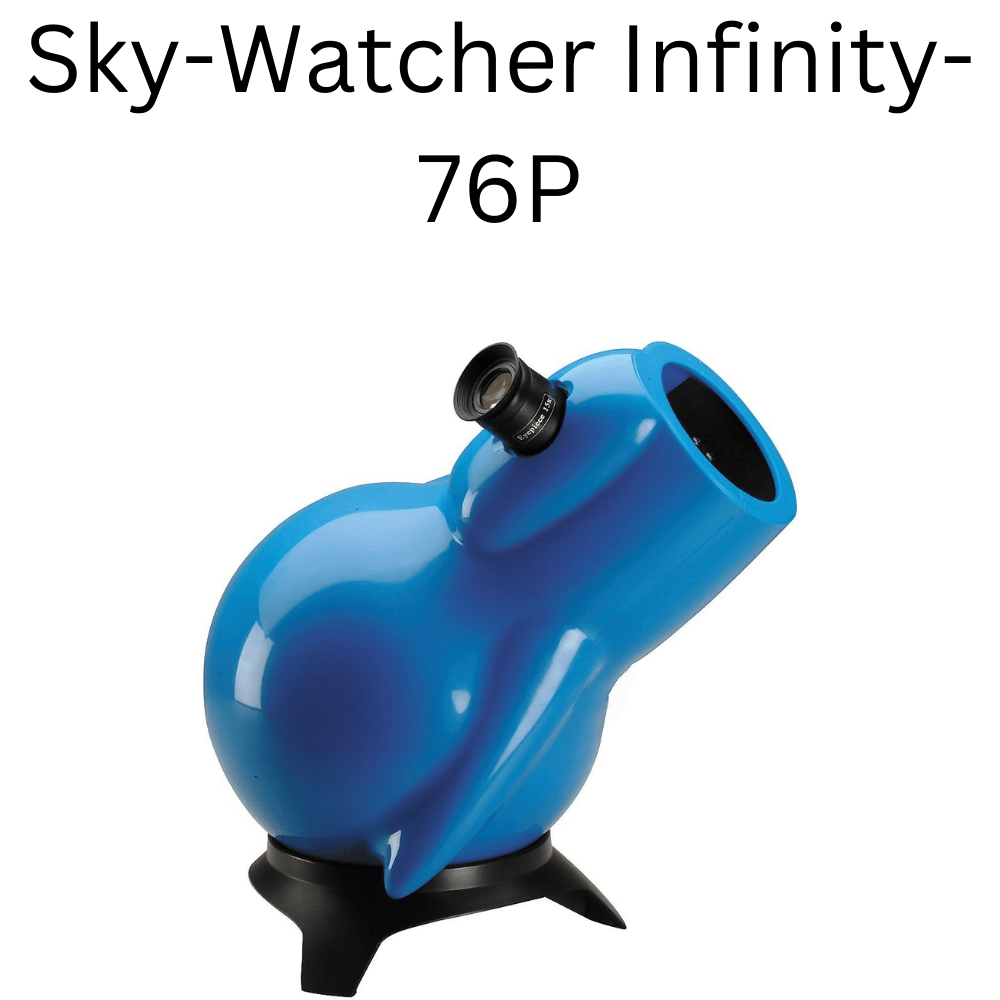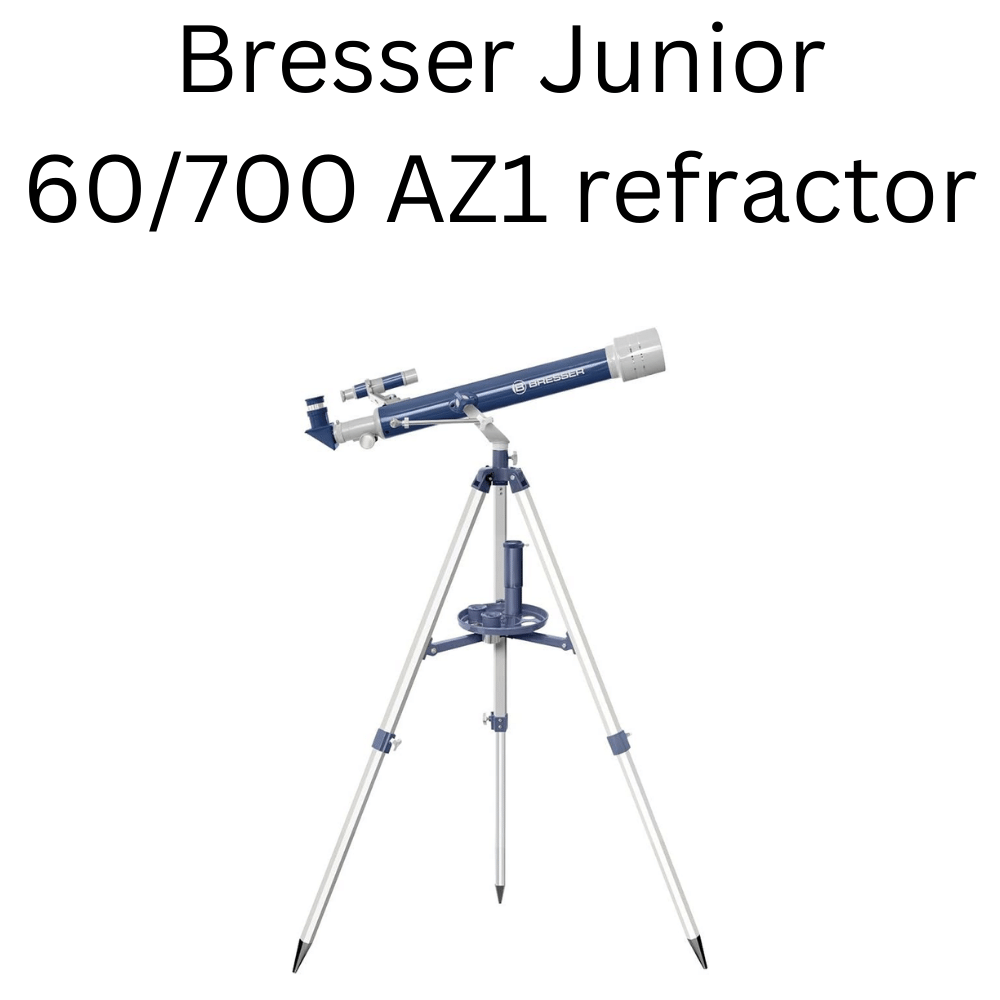Having a telescope at your house is great for children. Instead of looking at pictures in textbooks, they can see them for themselves and peak their interest and curiosity. I think purchasing a telescope is a good start for nurturing or growing your child’s curiosity. With their feet planted on the earth, they could explore the universe using these telescopes!
Best Telescope Brands
Ask six different people to tell us what telescope brands are best for them, and you will get six different responses. When describing bestsellers you will find a couple of different brands that you can see again and again - all of which are famous. They are most famous for adults' telescopes, but they also branch into kids' telescopes as well. It is worth looking at the different telescope models to see which will work best for you.
Sky-Watcher Infinity-76P
The Infinity-76P is an excellent choice for anyone wanting to get the most out of their stargazing experience. With its large 76mm objective lens, the Infinity-76P provides stunning views of the night sky and is capable of reaching high magnifications for detailed observation. The sturdy tripod ensures stable viewing, even when zoomed in at high power, and the included red dot finder makes locating objects a breeze.

If you're looking for an affordable, high-quality telescope that will give you years of enjoyment, the Infinity-76P is a perfect choice.
Pros and Cons of Sky-Watcher Infinity-76P
|
Pros |
Cons |
|
-
Large 76mm objective lens for stunning views of the night sky -
Capable of reaching high magnifications for detailed observing -
Sturdy tripod ensures stable viewing, even when zoomed in at high power -
Included red dot finder makes locating objects a breeze |
-
Some users have reported quality control issues with the included red dot
finder -
Some assembly is required |
The Infinity-76P is a great choice for anyone looking for an affordable, high-quality telescope. Its large 76mm objective lens provides stunning views of the night sky, and its high magnifications allow for detailed observation. The included red dot finder makes locating objects easy, and the sturdy tripod ensures stable viewing. However, some users have reported quality control issues with the red dot finder, and assembly is required.
Bresser Junior 60/700 AZ1 Refractor
This telescope is a great option for beginning astronomers. It is easy to set up and use, and it comes with everything you need to get started. The Bresser Junior 60/700 AZ1 refractor has a 60mm objective lens, which gives you a clear view of the night sky. It also comes with an adjustable tripod, so you can set it up anywhere. The Bresser Junior 60/700 AZ1 refractor is a great choice for anyone who wants to get started in astronomy.

|
Pros |
Cons |
|
-
Easy to set up and use -
Comes with everything you need to get started -
60mm objective lens gives you a clear view of the night sky -
Adjustable tripod lets you set it up anywhere |
Some
users have reported that the telescope is not very durable and that the
lenses are of poor quality. |
Orion FunScope 76mm tabletop reflector
This reflector telescope is great for beginning astronomers. It is simple to setup and use, and it provides clear views of the night sky. The Orion FunScope 76mm tabletop reflector is a great choice for anyone who wants to explore the wonders of the cosmos.
The Orion FunScope 76mm tabletop reflector comes with everything you need to get started in astronomy. The telescope and mount are easy to assemble, and the included eyepieces provide clear views of the night sky. The FunScope also comes with a finderscope, which makes it easy to locate objects in the sky.

The Orion FunScope 76mm tabletop reflector is a great choice for anyone who wants to explore the wonders of the cosmos. With its easy setup and clear views, the FunScope is perfect for beginners and experienced stargazers alike.
|
Pros |
Cons |
|
-
Comes with everything you need to get started in astronomy -
Easy to assemble and use -
Provides clear views of the night sky |
eyepieces
included with the telescope are not of high quality. |
Sky-Watcher Heritage-76
The telescope is a great way to get started in the world of astronomy, and the Heritage-76 is a great choice for beginners. It's a 76mm refractor telescope, which means it uses lenses to collect and focus light.
The telescope comes with two eyepieces (20mm and 10mm), so you can choose the one that gives you the best view. The 20mm eyepiece will give you a wider field of view, while the 10mm eyepiece will allow you to see more detail. The telescope also comes with a finderscope, which will help you locate objects in the sky.

If you're looking for a telescope that will give you a great view of the night sky, then this is the one for you.
|
Pros |
Cons |
|
-
Great for beginners -
Comes with two eyepieces -
Finder scope included -
Good price |
-
Short focal length means objects will appear small in the telescope -
Not ideal for observing faint objects |
Meade LightBridge Mini 82mm
The Meade LightBridge Mini 82mm is a great choice for anyone looking for a small but powerful telescope. This telescope is perfect for viewing the moon and planets, as well as bright deep-sky objects such as galaxies and nebulae.
The compact design makes it easy to transport and setup, while the large aperture allows for great light-gathering power. The Meade LightBridge Mini 82mm is a great choice for anyone interested in astronomy.

There are a few pros and cons to the Meade LightBridge Mini 82mm that should be considered before purchasing this telescope.
|
Pros |
Cons |
|
-The
compact design makes it easy to transport and setup -The
large aperture allows for great light-gathering power -The
telescope is perfect for viewing the moon and planets, as well as bright deep
sky objects |
The
telescope is not recommended for beginners -The
price may be too high for some budgets |
Overall, the Meade LightBridge Mini 82mm is a great choice for anyone interested in astronomy. The telescope offers great light-gathering power and is perfect for viewing the moon and planets, as well as bright deep-sky objects. However, the telescope is not recommended for beginners and the price may be too high for some budgets.
Celestron AstroMaster LT 60AZ Refractor
Celestron's AstroMaster LT 60AZ refractor is a great choice for beginning astrophotographers. Its simple design and easy-to-use features make it a great telescope for anyone interested in exploring the night sky.
The 60AZ has a 60mm objective lens and a focal length of 700mm, making it ideal for viewing planets and bright stars. The telescope also comes with red-dot finder scope, making it easy to locate objects in the night sky. The AstroMaster LT 60AZ is a great choice for anyone interested in getting started in astrophotography.

One of the great things about refractor telescopes is that they are relatively lightweight and portable, making them ideal for astrophotography. The AstroMaster LT 60AZ is no exception, weighing in at just 5.5 pounds. This makes it easy to take with you on your travels or to set up in your backyard for some night sky observation.
|
Pros |
Cons |
|
-Ideal
for beginning astrophotographers -Simple
design and easy-to-use features -Lightweight
and portable -Comes
with a red-dot finder scope |
-May
not be suitable for more advanced astrophotography -Limited
aperture size may limit views |
Orion StarMax 90mm TableTop Maksutov-Cassegrain
The Orion StarMax 90mm TableTop Maksutov-Cassegrain is a great choice for beginning amateur astronomers or anyone who wants to enjoy great views of the night sky without having to invest in a larger telescope.
This petite, yet powerful 90mm Mak-Cass delivers bright, sharp images of the Moon and planets, plus deep-sky objects like the Orion Nebula while occupying a mere 12" of tabletop space.
The StarMax 90mm is a great all-around performer, providing stunning views of everything from lunar craters to nebulas. Its Maksutov-Cassegrain optics make it especially well suited for planetary observing, as this design creates an inherently stable image that is virtually free of chromatic aberration.

The 90mm aperture and 900mm focal length (f/10) combine to make the StarMax 90 a great deep-sky performer as well, delivering bright views of star clusters, galaxies, and nebulas.
|
Pros |
Cons |
|
-
90mm aperture and 900mm focal length (f/10) -
Maksutov-Cassegrain optics for a stable image -
Great for planetary and deep-sky observing -
Tabletop design takes up minimal space |
-
Some users may prefer a larger aperture telescope |
Celestron - 114LCM Computerized Newtonian Telescope
One of the great things about this telescope is that it's very easy to set up. You don't need any special tools or knowledge, and you'll be able to get started right away. The 90mm optics are perfect for beginners, and you'll be able to see planets, stars, and other celestial objects with ease. The automatic tracking will keep your targets in view and you won't have to worry about them moving out of sight.
If you're looking for a great way to get started in astronomy, this is the telescope for you. It's easy to set up and use, and you'll be able to see amazing things in no time.

|
Pros |
Cons |
|
-Easy
to set up -Great
optics for beginners -Automatic
tracking keeps targets in view |
-More
experienced astronomers may want more powerful optics -Automatic
tracking can add to the cost of the telescope |
Guide For Buying Kids Telescope:
When you're looking to buy telescopes for children you have to look at several factors: We designed the following guide to simplify the buying process. We will go through this one.
There are a few things to consider before purchasing this telescope.
Telescope Range
First, it is important to note that the 90mm optics are great for beginners but may not be enough for more experienced astronomers.
Automatic Tracking Feature:
Additionally, the automatic tracking feature is a great convenience but it can also add to the cost of the telescope.
Overall, this is a great telescope for beginners but more experienced astronomers may want to consider another option.
Summary
A telescope is a powerful tool that can help children explore the night sky. There are many different types and sizes of telescopes, so it is important to choose one that is best suited for your child's needs.
In general, smaller telescopes are better for children because they are easier to use and carry. Refractor telescopes are a good choice for children because they are simple to setup and use.
If you plan on using your telescope frequently, it is important to choose one that is durable and easy to care for. Ultimately, the best telescope for your child is the one that they will enjoy.
FAQS About Telescope for kids
How do you choose a telescope for kids?
The cost of a telescope for a child may vary depending on the telescope's type, aperture, ease of access, and cost. Telescopes are offered in 3 basic varieties: Refractor telescopes are the most commonly used telescope for children and they are the most affordable.
Is a telescope a good gift for kids?
Telescopes stimulate children's imaginations and encourage them in thinking. Seeing stars and moons can be a fun activity and an enjoyable hobby. Stargazing can be a great activity for any age group.
How do I choose the right telescope for my child?
It depends on your child's age, interests, and skill level. If your child is very young, a simple refractor telescope might be the best option. If your child is older and more interested in astronomy, a computerized telescope might be a better choice.
What are the best telescope brands for kids?
Some of the best telescope brands for kids include Meade, Celestron, and Orion.
How much should I spend on a telescope for my child?
It depends on your budget and your child's interests. A simple refractor telescope can be purchased for around $100, while a more advanced computerized telescope can cost several thousand dollars.
What are the best accessories for a kid's telescope?
Some of the best accessories for a kid's telescope include binoculars, a camera adapter, and software that can help your child learn about astronomy.









